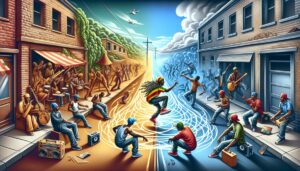Hip-hop music has a rich history of drawing inspiration from various genres, and one of the most influential has been reggae. With its infectious rhythms and socially conscious lyrics, reggae music has been a major source of sampling material for many hip-hop artists over the years. From iconic tracks by The Notorious B.I.G. to modern hits by Drake, reggae samples continue to play a significant role in shaping the sound of hip-hop.
Reggae music, originating in Jamaica in the late 1960s, has always been known for its laid-back grooves and powerful messages. Artists like Bob Marley, Peter Tosh, and Jimmy Cliff used their music as a platform to speak out against social injustice and spread messages of love and unity. These themes resonated with many hip-hop artists, who also used their music to address pressing issues in their communities.
One of the earliest hip-hop tracks to incorporate reggae samples was Grandmaster Flash and the Furious Five’s “The Message.” Released in 1982, the song featured a sample of reggae artist Duke Reid’s “Stalag 17,” which added a unique flavor to the track and helped establish the trend of blending hip-hop with reggae influences. Since then, countless hip-hop artists have followed suit, using samples from reggae classics to create new and innovative sounds.
One of the most iconic uses of reggae samples in hip-hop can be heard in The Notorious B.I.G.’s hit song “Warning.” The track, released in 1994, features a sample of reggae legend Yellowman’s “Zungguzungguguzungguzeng,” which provides a catchy hook that complements Biggie’s smooth flow. The fusion of reggae and hip-hop elements in “Warning” helped solidify The Notorious B.I.G.’s status as one of the greatest rappers of all time.
In more recent years, artists like Drake have continued to pay homage to reggae music through their use of samples. Drake’s 2016 hit “Controlla” features a sample of Jamaican artist Popcaan’s “Love Yuh Bad,” adding a tropical vibe to the track that resonated with listeners around the world. By incorporating reggae samples into his music, Drake was able to tap into the global appeal of reggae music and create a sound that transcended traditional genre boundaries.
The use of reggae samples in hip-hop is not just a random artistic choice – it is a deliberate nod to the roots of hip-hop and a way of paying tribute to the music that influenced the genre. By incorporating reggae samples into their music, hip-hop artists are able to create a sense of nostalgia and familiarity for their listeners, while also introducing them to new sounds and perspectives.
As hip-hop continues to evolve and push the boundaries of musical expression, reggae samples will undoubtedly remain a key ingredient in the genre’s sonic palette. The fusion of reggae and hip-hop not only creates an exciting blend of sounds but also serves as a reminder of the power of music to bridge cultural divides and connect people from all walks of life.
In conclusion, the use of reggae samples in hip-hop is a timeless tradition that has helped shape the sound of the genre for decades. From its roots in Jamaica to its influence on hip-hop pioneers, reggae music continues to inspire artists to this day. So the next time you hear a reggae sample in a hip-hop track, take a moment to appreciate the rich history and cultural significance behind the music – it’s more than just a catchy beat, it’s a testament to the enduring power of music to unite us all.



